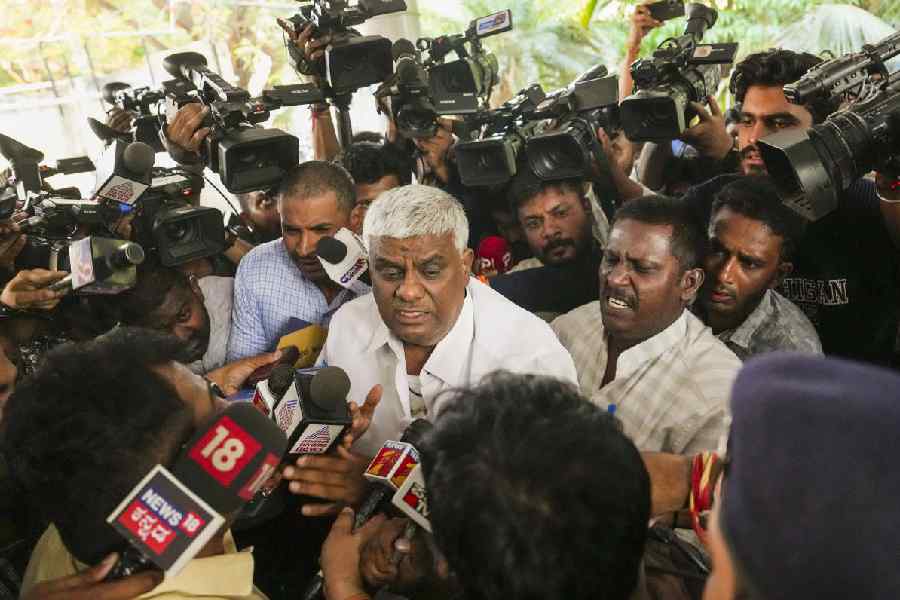 |
Villupuram, May 9: The Sankaracharya of Kanchi went to visit a slum. That is what the media will focus on. But will he accept a glass of water from a Dalit? This was the question put by S. Ramadoss, leader of the Pattali Makkal Katchi, to the overflowing Dalit gathering at the Arjeneya Kalyana Mandapam, a two-tiered marriage hall in Villupuram town. These are the BJP’s tricks, he continued, to divide the Dalits who are together.
His appearance was the high point of a meeting that announced the Dalits’ support for the DMK-led Democratic Progressive Alliance (DPA), and therefore the Congress. It is hardly a natural convergence. The PMK has been a party for the Vanniyars, among the most backward of the Other Backward Classes. It is only recently that Ramadoss has been welcoming the Dalits.
The Dalit backing would be a major gain for the PMK. Ramadoss himself has acknowledged this to C. Nicholas, the organiser of this pledge of support and initiator of Ambedkar Peravai, a political forum of the Dalits.
What Nicholas brings with him is considerable. Convener of the Dalit Land Rights Federation, he is fighting for Dalit rights and against torture on them with 15 NGOs, 14 local and one international, in northern Tamil Nadu and in Pondicherry. Although he has been invited to share the dais with Karunanidhi and Sonia Gandhi at their meeting in Chennai on May 7, he is confident of channelling only 40 per cent of Dalit votes in the DMK’s direction.
Systematic RSS propaganda, he feels, has seduced a large section of this underprivileged population to feel they are not excluded from the caste Hindu fold. Showy Ganesha festivals, never before seen in Tamil Nadu, are targeted towards Dalit participation. Ganesha was just a quiet household god. The RSS is canny enough to know that Ram would be a flop in the state. So towering statues of Hanuman, or Arjeneya, dot the roadside, for Hanuman will invariably lead to Ram. For a people who cannot enter temples if their caste is known, this is shrewd psychological penetration. Their leaders think that it is part of a strategy to build the foot soldiers for a Hindu force, to be turned against the minorities.
All that the BJP is talking about is a Ram temple, said a speaker at the meeting. Ram and Sita’s story is imaginary. Why don’t they build the temple on Valmiki’s head, where Ram was actually born? All the speakers reiterated Nicholas’ hope of uniting the Dalits, minorities and backward classes in order to bring revolutionary change in politics.
According to Nicholas, he is only trying to give shape to Ambedkar’s dream, in which Dalits will ultimately seize leadership in this new alliance. Kanshi Ram had tried it, too, but Mayavati seems to have gone in a different direction.
Leaders of other Dalit parties, Nicholas feels, have betrayed their people by playing on emotions, and not politicising them. The real issues have been lost. He and his federation are fighting to recover the Dalits' right to panchami land, marked off specifically for them by the British. The recovery of their entitlements is primary. The access to temples, for example, or to drinking water sources, PDS shops, the panchayat library or the primary health centre in the village. These are invariably located in the caste Hindu areas in each village and not on the common space between Dalit and non-Dalit localities. Even tea shops have a separate set of glasses for them.
Given the history of Vanniyar-Dalit hostility, the PMK is an odd champion to back. But the federation has no choice, for in most of the six districts, the DPA has put up PMK candidates.
Last time, the federation refused to back the DMK because it went with the BJP. And Jayalalithaa had promised to accept the demands of the Dalits drafted by the federation and had stated categorically that the BJP was anathema to her. The situation is exactly the reverse this time. Besides, the anti-conversion act is directed specifically against the Dalits, they feel, because conversion was the only weapon they had.
No other movement unifying the entire segment of the underprivileged and deprived has yet succeeded. Nicholas and his men are working on hope. But he is convinced that the only way to the goal is through direct participation in electoral politics.










